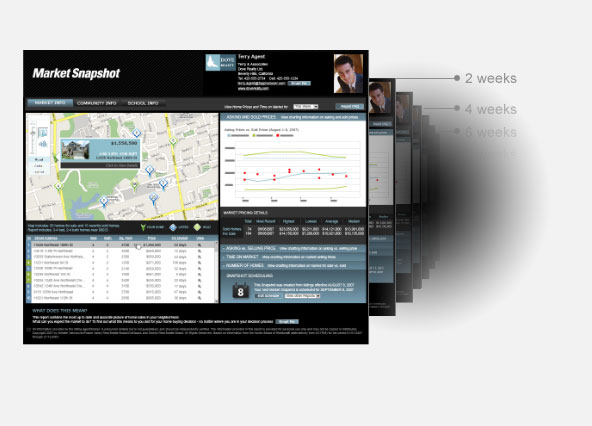 |
| Market Snapshot - Real Time Online MLS data |
|
 This month we have included the latest version of Market Snapshot,
an award-winning, real-time MLS graphical report. The industry’s most
current online real estate report has a new look and layout which
offers even more market information on one page. Key comparative MLS
data charts, including Asking price VS. Selling Price, Selling Times,
and Neighborhood Inventory, are now available on the front page,
through convenient collapsible sections. These enable viewers to remain
in one web window and not have to toggle back and forth to compare
data. You can have up to 100 of the closest active and sold
listings displayed on the map for the Seller’s Market Snapshot as well
as the Buyer’s. This month we have included the latest version of Market Snapshot,
an award-winning, real-time MLS graphical report. The industry’s most
current online real estate report has a new look and layout which
offers even more market information on one page. Key comparative MLS
data charts, including Asking price VS. Selling Price, Selling Times,
and Neighborhood Inventory, are now available on the front page,
through convenient collapsible sections. These enable viewers to remain
in one web window and not have to toggle back and forth to compare
data. You can have up to 100 of the closest active and sold
listings displayed on the map for the Seller’s Market Snapshot as well
as the Buyer’s.
|
|
 |
| Looking to Buy or Sell a Home? Find a Great Real Estate Agent |

When you're looking for a real estate agent,
avoid hiring someone just because they're your friend or family member;
getting a referral can prove a valuable resource, but don't feel
obligated to do business with a particular agent just because you know
them.
Experience is another crucial aspect of hiring a great
agent. The enthusiasm of a new agent can be convincing, but there's
nothing comparable to the contacts and marketing experience a more
seasoned marketing agent can provide. The real estate profession has a
remarkably high turnover rate of 80 percent, according to the National
Association of Realtors, so ask a prospective agent for references and
the last 10 fliers from homes they helped their clients sell or buy,
depending on their specialty. You should try and find an agent with
experience and certification with the local, state, and national
associations of Realtors, which ties them to a code of conduct and
professionalism, as well as the Multiple Listings Service database.
Remember
that you are hiring the real estate agent, so it's okay to ask
questions. Make sure your personalities and attitudes are a match. They
should be open to your suggestions and a good listener. If you're
looking for a home in the country with some acreage, and your agent
continually takes you to view homes in the suburbs with swimming pools,
it's time wasted for the both of you --so make sure your agent is
attentive. Finally, you want to know that your agent is available if a
home that meets your specifications comes on the market, or if a
potential buyer for your home contacts them. Call your prospective
agent when they're not expecting your call to see if they answer, and
if they don't, see how promptly they return your call.
The
better your real estate agent, the more confident you'll be during the
home buying/selling process, so seek a good real estate agent that will
be a good fit every step of the way.
|
|
|
|
 |
|
 Shopping
for a home is a big undertaking, but add a few hundred (or thousand) miles and
you've got a long distance headache. But luckily, with today's technology, home
shopping across the miles is much easier. Here are some tips to help you find
your new home: Shopping
for a home is a big undertaking, but add a few hundred (or thousand) miles and
you've got a long distance headache. But luckily, with today's technology, home
shopping across the miles is much easier. Here are some tips to help you find
your new home:
Look online. You'll be able to search for homes in the city you're moving to
based on price, size, neighborhood, and many other factors that might make or
break a housing decision. Looking online and in the classified section of the
city's newspaper should help narrow down some choices. Once you've narrowed
your choices down, you'll be able to make an appointment with a realtor to view
the properties that meet all of your specifications, saving you valuable time
and effort.
When it comes to finding a realtor, if you're moving for work, you may be
assigned a relocation specialist whose company will have an agent they usually
work with. However, if you're not getting help with your move, you'll need a
real estate agent to represent your interest as a buyer; so ask your new
employer, or a friend, or a family member that lives in the area for a
referral. If you don't know anyone in your new town, ask your local realtor for
a referral. Realty is a profession that thrives off networking, so chances are
your local realtor can connect you with someone in your new town.
One note of caution: hiring a good real estate agent is important in any
situation, but it's particularly important when you're shopping for a home long
distance. Your realtor should be a good communicator, keep in touch with you,
and be attentive when you discuss your wants and needs. Especially if you're
under a time constraint, your realtor should only contact you about the kinds
of properties you've expressed interest in.
Lastly, don't trust your agent too much--even with the availability of useful
tools like virtual tours, buying a house sight unseen is just not a good idea.
Your research and real estate agent may have given you a lot of information on
a house, but there are factors like walking through a neighborhood to get a
feel for it, and visiting the schools your children will attend, that you
should check out first. After you've done your research and found some homes
you're interested in, you and your family should plan a weekend where you can
go to your new town and tour houses. As a family, you should pay special
attention to the neighborhoods, the distance from work, schools, the gym, the
mall, museums, etc.
Shopping for a new home and moving to a new city should be exciting, so try not
to get so distracted by the destination that you don't enjoy the journey along
the way. As long as you do your research, keep the lines of communication open
with your realtor and family, and be cautious before making any major
decisions, you'll find the perfect new home--whether it's a few states away or
on a different continent.
|
|
 |
| Financial FAQs for First Time Home Buyers |
What financial benefits are there to buying a
home, instead of renting?
When you rent a home, you essentially throw that money away every month, but
when you buy a home, you're making a lasting investment. Even better, when you
own a home you can deduct each month's mortgage interest from your , and
sometimes even state income taxes, which will save you a lot over time by
basically reimbursing you for the interest you pay each year. You can also
deduct the property taxes you pay on your home. And keep in mind that the more
pride you take in your home by renovating it and doing home improvements, the
more likely it is that your house will increase in value over the years, making
it an even more lucrative investment, not to mention more comfortable and
enjoyable for you and your family to live in.
How much of a deposit should I plan on
putting down toward my first home?
The amount of deposit depends on the price of the home you're looking to
purchase, along with the specifications of the lender you decide to work with.
However, a general rule of thumb is to plan on depositing 5% of the price of
the home as your down payment.
Besides a down payment, what else do I
need to apply for a home loan?
You'll need documentation that confirms your identity and your income, like
your driver's license and birth certificate, tax returns, pay stubs, and bank
statements.
What other fees can I expect during the
home purchasing process?
You should generally budget between 5-7 % of the price of the home (on top of
the money you'll deposit) to cover additional fees and charges that come along
with buying a home. Depending on your unique situation there may be a different
amount of fees, but generally the fees are: building and pest inspection, valuation
fees, lenders' mortgage insurance, connection fees for phone, gas, water, and
electricity, and solicitors fees.
|
|
 |
| Tips for a Stress Free Move |
|
 Moving
is a big decision, not to mention a lot of work. But once you've put in
the required notice at your rental office, or you've sold your home and
found the perfect living space in your new city, the planning should
begin. Preparing for a move can be a very stressful undertaking, but,
if properly planned, you can definitely simplify the process, making
the transition from your old home to your new one much smoother. Moving
is a big decision, not to mention a lot of work. But once you've put in
the required notice at your rental office, or you've sold your home and
found the perfect living space in your new city, the planning should
begin. Preparing for a move can be a very stressful undertaking, but,
if properly planned, you can definitely simplify the process, making
the transition from your old home to your new one much smoother.
Be prepared.
Having adequate supplies will make your move easier, so you'll want to
have more than just boxes. You'll need packing tape to seal your boxes,
permanent markers to label them, newspaper to insulate breakable
objects, and bubble wrap to protect your more fragile belongings. You
should be able to obtain boxes from your local grocery store, but if
they're out of boxes, try fast food restaurants. You may consider
purchasing some plastic storage boxes if you have items you won't be
using soon after the move. If you have a few boxes of items that are
going to go straight into the attic, for example, plastic boxes might
be a wise investment.
Start early. Sorting
through your belongings will help you decide if there are some things
you can part with -- without missing it later on. Even if you end up
keeping everything you own, take advantage of the fact that there are
items you only use part of the year. If it's summer, you can pack your
skis and your winter clothing first, as you won't be needing those
items for a while. The early phase of packing is the time to pack up
that stack of books you've been meaning to read, Christmas lights,
holiday decorations, and any other items you can comfortably live
without until you've moved into your new place. If you're finding you
have a lot of items that are in good condition that you want to be rid
of, have a moving sale. You can use the profits to help you with moving
expenses, and you can donate the items left over to a local charity.
Clearly label boxes.
When labeling boxes, try to be as descriptive as possible. Instead of
labeling sheets and pillowcases "guest bedroom," for
example, label them "sheets and pillowcases- guest bedroom," and
so on. This will not only help you know where to place the boxes on
moving day- it will also help you locate an item if you find yourself
needing it before you've completely unpacked.
Plan, plan, plan.
If you're not planning on hiring a moving company, start recruiting the
help of friends and family members early on. Usually, they'll be happy
to help as long as they've been given enough notice, and you'll likely
have plenty of time beforehand to ask them in advance. Make sure you
call or send an email reminder a week before moving day to remind them.
On the day your helpers arrive, make it a goal to have all your
belongings packed in boxes, and disassemble the furniture that can be
disassembled.
Remember that everything you can do ahead of time
will make your move simpler for everyone, and considering the fact that
moving is naturally stressful, the more you can prepare yourself for a
smooth moving transition, the better.
|
|
 |
| Tax Credit and Housing Updates |
| By Gina Steed |
|
 Tax Credit for Home Buyers Tax Credit for Home Buyers
First-time
home buyers who purchase homes from the start of the year until the end
of November 2009 may be eligible for the lower of an $8,000 or 10% of
the value of the home tax credit. Remember a tax credit is very
different than a tax deduction – a tax credit is equivalent to money in
your hand, as opposed to a tax deduction which only reduces your
taxable income.
The
tax credit starts phasing out for couples with incomes above $150,000
and single filers with incomes above $75,000. Buyers will have to repay
the credit if they sell their homes within three years.
Additional Housing-Related Provisions
Tax Incentives to Spur Energy Savings and Green Jobs
— This provision is designed to help promote energy-efficient
investments in homes by extending and expanding tax credits through
2010 for purchases such as new furnaces, energy-efficient windows and
doors, or insulation.
Landmark Energy Savings
— This provision provides $5 Billion for energy efficient improvements
for more than one million modest-income homes through weatherization.
According to some estimates, this can help modest-income families save
an average of $350 a year on heating and air conditioning bills.
Repairing Public Housing and Making Key Energy Efficiency Retrofits To HUD-Assisted Housing —This
provision provides a total of $6.3 Billion for increasing energy
efficiency in federally supported housing programs. Specifically, it
establishes a new program to upgrade HUD-sponsored low-income housing
(for elderly, disabled, and Section 8) to increase energy efficiency,
including new insulation, windows, and frames.
Expanding Housing Assistance
— This provision increases support for several critical housing
programs. It includes $2 Billion for the Neighborhood Stabilization
Program to help communities purchase and rehabilitate foreclosed,
vacant properties.
More Help for Homeowners in the Future
Another
thing to keep an eye on in the coming weeks is President Obama’s plan
to help struggling borrowers before they are faced with a default on
their mortgage.
According
to reports, the Obama administration is discussing plans to help
borrowers who are struggling to stay afloat, but who have not yet
fallen behind on their payments. At this point, details are scarce;
however, reports indicate that President Obama is looking to spend
approximately $50 Billion to directly help homeowners before they face
foreclosure and financial disaster.
While
this is good news for individual homeowners, it will likely be good for
the housing industry as a whole. That’s because, assisting struggling
borrowers before they default should help stop the wave of
foreclosures, which are estimated to top two million this year. That,
in turn, will help stabilize home prices.
The
Economic Stimulus Plan is huge, and impacts a number of industries.
I’ve highlighted some of the major provisions that may impact you now
and in the future.
|
|
 |
NO BONES ABOUT IT!
SUPERIOR SERVICE - SUPERIOR RESULTS! |
|
|
 |
March 2009
In This Issue:
|
|
 |
Catherine Bennison's
South Bay
Real Estate Newsletter
|

|
|
Catherine & Winston
Direct: (310) 707-2162
Cell: (310) 748-7889
Fax: (310) 519-1882
E-Mail: CBennison@KW.com
Website: www.CatherineBennison.com
This Month in Real Estate
Click to View Video HERE
Get A FREE Analysis of Your Market Area
MLS Market Snapshot
|

|
|
Preventing Foreclosure
|
|

Foreclosure is a bleak reality in the country's current real estate
crisis, but even in difficult financial situations, it's avoidable with
these steps:
1. Face the problem head on. When you realize
you're falling behind on your mortgage payments, contact your lender...
most lenders provide options for borrowers to help them get through
difficult financial times without facing foreclosure.
2.
Prioritize your spending. A mortgage is often the largest expense a
family is responsible for, but difficulty paying the mortgage is
usually due to poor money management, not lack of money. Write down
every purchase you make in a week and you may start to see that
frivolous spending (eating out, buying unnecessary items, etc.) is
adding up and taking away from the mortgage fund. Consider eliminating
optional expenses like cable, internet, and club membership until
you're caught up on mortgage payments and have a budget in place to
prevent it from happening again.
3. Use your assets. If you're
in dire financial straits and having difficulty catching up on your
mortgage payments, consider selling a second car or getting a second
job to help catch up. This will not only bring more money into your
home, but it will also demonstrate to your lender that you are actively
trying to keep your home, even if it means making sacrifices.
4.
Know your rights. Contact your State Government Housing Office to learn
about foreclosure laws and timelines in your state to find what your
lender can legally do if you don't make your payments. And finally,
don't succumb to "foreclosure prevention companies" preying on the
vulnerable. These companies often charge the equivalent of 2-3 months'
worth of mortgage payments to negotiate with your lender, a service
that various nonprofit organizations will do for free.
|

|
|
Good Smell, Easier Sell: How Fragrance Can Help Sell Your Home
|
|

Did you know that, according to ActiveRain.com, the most
successful fragrance to use when you're trying to sell your home is a cinnamon
apple fragrance? If you're looking to sell your house, your nose knows, but how does it work? Potential
homebuyers subconsciously equate certain scents with feelings of comfort and
familiarity, definitely factors that will help them imagine living in your
home, so before you open your house for tours, try these home staging tips to
help get your home smelling fresh and fabulous:
Bake something before guests arrive. The smell of freshly baked bread or the
aroma of an apple pie a few minutes out of the oven will really waft throughout
your home and right into the noses of potential home buyers.
Use candles. You don't even have to light candles for them to help brighten up
the fragrance of a room, so place some candles in closets, bathrooms, and
bedrooms to freshen things up a bit.
Buy some flowers. A vase of flowers on your kitchen table will not only
brighten up your kitchen, but if you use a fragrant variety of flowers like
roses or gardenias, they'll enhance your home's selling power.
Simmer a pot of mulling spices on your stove for an easy sweet-smelling kitchen.
Try simmering cinnamon sticks and cloves on your stove in some water on low temperature
and your home will start smelling good enough to eat (or live in!).
Finally, remember that with scents, less is always more. Everyone has had an
experience with too many scents at a perfume store or an overpowering cologne
worn by someone in an elevator, so when you're using fragrances to stage your
home for tours, don't go overboard. And remember, if all else fails, use an
apple cinnamon fragrance to charm potential home buyers.
|

|
|
DoggieNews
|
|
DoggieNews.com is a weblog publishing news about dogs, the pet industry, new products, and other quirky canine stuff.
Our
target audience consists of folks who own dogs, and who seek
information to help them make purchasing decisions, health and
entertainment choices, and to keep abreast of legislative and
regulatory changes that might affect their dog ownership.
Got News?
Please
share your dog and pet related news concerning your company or
organization. To do so, please write up a news article, and submit it
to us at the email address below. We will consider it for publication
in our monthly newsletter.
cbennison@KW.com
  

|
|
 |